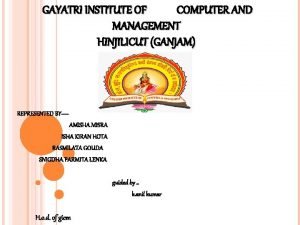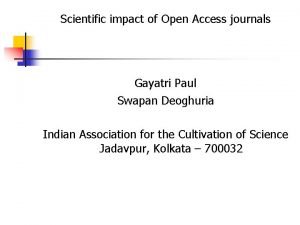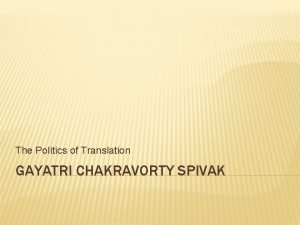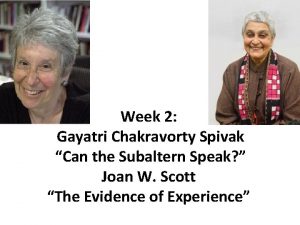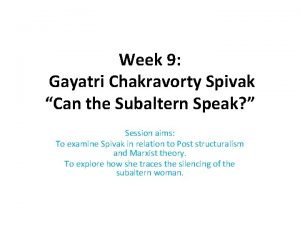Gayatri Chakravorty Spivaks Death of a Discipline Presented







- Slides: 7

Gayatri Chakravorty Spivak’s Death of a Discipline Presented by: Altaaf Hasan Ahmed ( 203111671) Supervised by: Dr. Elham Al-Bassam Tuesday December 12, 2006

"To be human is to be intended toward the other" l Gayatri Chakravorty Spivak (born February 24, 1942 in West Bengal) is a literary critic and theorist. She is best-known for the article "Can the Subaltern Speak? ", which is considered a founding text of postcolonialism. l and also for her translation of Jacques Derrida's Of Grammatology. Spivak currently teaches at Columbia University in addition to giving lectures around the world.

l Spivak's curriculum reform is intended for the world as a "classroom without walls. “ l She is aware of the pitfalls as each subject matter shifts to foreign matters l Therefore she wants to include Area studies to interpret the language and idiom of the “Other” through the literary method instead of learning the language of the “Other” as simply a fieldwork tool.

Crossing Borders l about traversing disciplinary boundaries as well as the divides of the international society (South and North). l Spivak feels that Area Studies, "with its roots in the Cold War, " concentrates on the rigorous knowledge of the Other in the service of power. l Comparative Literature studies other literary traditions and compares them to other literatures; however it generally takes seriously only the literatures of Euro-U. S.

l The solution is to bring together Comparative studies with Area Studies l Look @ the language and idiom of the global South l Open to the “others” and include them in comparative literary studies.

How do we cross borders? l l l First is to be armed with linguistic skills and literary competence, provided by Area Studies Second is “Collectivities”. to imagine an inclusive Comparative Literature freed from its traditional national anchorings, a border-crossing discipline honed by careful reading that encourages linguistic competence and includes the languages of the Southern Hemisphere 'as active cultural media

l Attempts to “depoliticize” in order to move away from a politics of hostility, fear, and half solutions. ‘End’

